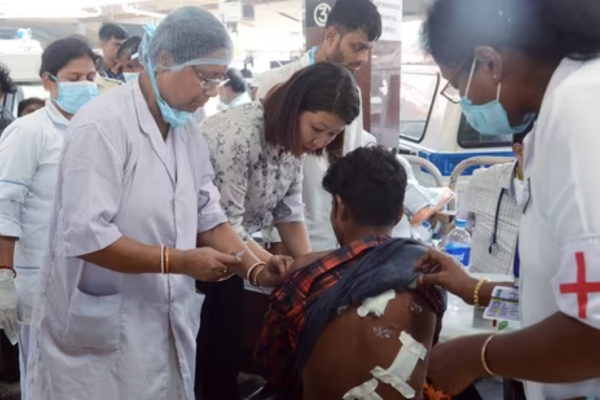Doctors on the Frontlines: Medical Professionals in Disaster Relief
Total Views |
When disaster strikes, whether it's a natural calamity, a humanitarian crisis, or a global pandemic, doctors are on the frontlines and are among the first to respond, putting their lives on the line to provide crucial medical assistance to those in need. These brave medical professionals demonstrate incredible resilience, selflessness, and dedication as they work tirelessly to save lives and alleviate suffering.
_202307011714132213_H@@IGHT_400_W@@IDTH_600.png)
Devastated infrastructure, limited resources, and overwhelming demand for medical care often characterize disaster-stricken areas. In these challenging environments, doctors exhibit remarkable resilience, adapting to austere conditions and using available resources best. They confront shortages of medical supplies, endure physical and emotional exhaustion, and confront a wide array of medical emergencies. Yet, they persevere, drawing strength from their commitment to the well-being of those in need.
One of the primary responsibilities of doctors in the face of disasters is to perform rapid assessments and triage. They evaluate the severity of injuries, illnesses, and medical needs, prioritizing care based on urgency. This process enables them to allocate limited resources efficiently, ensuring that critical cases receive immediate attention and intervention.
On this National Doctors Day let us take a look at how the Doctors were on the front in Disaster Relief -
1. The Odisha Train Accident

Several teams of doctors were dispatched from AIIMS and other central hospitals from Delhi to Bhubaneshwar, Balasore to help and give medical aid and assistance to the injured. At least 288 people were killed and over 1,100 were injured in the triple train catastrophe. Apart from this the Odisha government had mobilized an additional 50 doctors and deployed 115 ambulances for the rescue and treatment of all the injured persons. A 100-bed hospital and a dedicated ambulance corridor had been made ready at the SCB Medical College and Hospital to help with the medical assistance.
Doctors take on a crucial role in coordinating the overall medical response during disasters where they collaborate with other healthcare professionals, local authorities, and aid organizations to establish effective medical triage systems, field hospitals, and clinics.
2. 26/11 Mumbai Terror Attack
_202307011715432262_H@@IGHT_400_W@@IDTH_600.png)
It would be surplus to state that the human wheels that power the healthcare sector in India and every other part of the world have it tough. The epidemic showed what harsh hours and extremely precarious working conditions may do to a physician. Another time they were put under threat was when a group of terrorists attacked the streets of South Bombay in what became known as the 26/11 Mumbai terror attacks.
Even as the terrorists were sprinting up the staircase after gunning down two security guards, Cama and Albless Hospital night-duty staff nurse Anjali Kulthe saved the lives of 20 pregnant women by slamming shut the heavy double doors of the ante-natal care ward, turning off the lights, and moving everyone to the small pantry-space at the far end. Many people suffered from post-traumatic stress disorder (PTSD), where Psychologists and Psychiatrists provided medical aid.
The 26/11 Mumbai terror attacks in 2008 shook the nation, leaving a trail of devastation and tragedy in their wake. Amidst the chaos and terror, doctors emerged as unsung heroes, selflessly rendering medical aid and saving lives.
3. Kedarnath floods of 2013
_202307011716153278_H@@IGHT_400_W@@IDTH_600.png)
The devastating floods that struck the town of Kedarnath in 2013 left a trail of destruction and loss. In the aftermath of the floods, doctors were among the first responders to arrive in the affected areas. The first six senior doctors who went to Kedarnath as the first medical team was shaken and shocked by the magnitude of human suffering. But it did not stop them from providing medical assistance and doing their responsibilities.
In times of disaster, doctors shoulder significant responsibilities as they strive to save lives and alleviate suffering amidst the chaos. Their rapid assessments, emergency medical treatment, coordination of medical response, disease control measures, psychological support, public health advocacy, and collaboration efforts play a vital role in ensuring the well-being of those affected.


